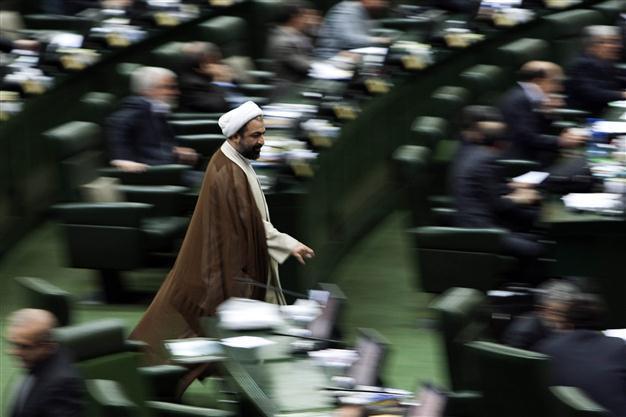Iran Parliament delays bill to cut EU oil exports
TEHRAN - Agence France-Presse

A lawmaker walks during a parliament session in Tehran. REUTERS photo
Iranian lawmakers delayed taking action on a proposed bill to immediately cut
oil exports to Europe in retaliation for an
EU oil
embargo, the parliament's energy commission said today.
"No bill has been designed nor has it come to the parliament," commission spokesman Emad Hosseini told Mehr news agency.
He said he hoped negotiations on preparing the bill would be finalized before Friday.
Lawmakers had initially been expected to enter the bill into parliament today, after calling for it to be drafted under "double emergency" procedures.
The proposed text aims to immediately halt oil exports to Europe in a bid to destabilize the fragile economies of several EU states.
It was called in retaliation for an EU embargo on Iranian oil announced Jan. 16 but whose implementation was meant to be phased in over the next five months to give struggling E.U. economies, such as Greece and Spain, time to find alternative oil suppliers.
But Hosseini said there was no bill yet, just "an idea by lawmakers" that still had to be studied by the energy commission before one could be drafted.
Iranian officials and lawmakers have expressed anger at the E.U. ban, which is designed to pressure Tehran to halt its
nuclear activities. Western countries allege
Iran is seeking a nuclear weapon, despite Tehran's denials.
Iran is the second-biggest producer in OPEC, behind Saudi Arabia. It pumps some 3.5 million barrels a day, and exports 2.5 million of them.
Around 20 percent of the exports go to E.U. countries, mainly Italy, Spain and Greece. Most of the rest goes to Asia, principally China, India, Japan and South Korea.
Ahmad Qalebani, the head of the National Iranian Oil Company (NIOC), was quoted by ISNA news agency as saying Iran was ready to stop its exports to Europe at a moment's notice, and that clients elsewhere in the world were willing to buy the oil.
He said of European companies: "Either they immediately stop buying Iranian oil, or they decide to keep long-term relationships" with the NIOC.
Qalebani also warned that, if exports to Europe were halted, EU companies that had Iranian oil shipments owing to them would be hurt.
"They would be disadvantaged and they would have a problem getting their capital back," he said.
That warning could worry Italian oil giant ENI, which has an estimated $2 billion in oil owed to it by the NIOC. Italy signed on to the EU ban on Iranian oil on condition that those "buy back" shipments would not be affected.
Qalebani also reiterated, according to the official news agency IRNA that, sometime in the near future, "we calculate that we are going to see the price of oil at between 120 dollars and 150 dollars a barrel" -- up to 50 percent more than today's price.
sanction, Hormuz,
